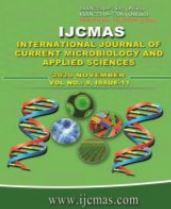


 National Academy of Agricultural Sciences (NAAS)
National Academy of Agricultural Sciences (NAAS)

|
PRINT ISSN : 2319-7692
Online ISSN : 2319-7706 Issues : 12 per year Publisher : Excellent Publishers Email : editorijcmas@gmail.com / submit@ijcmas.com Editor-in-chief: Dr.M.Prakash Index Copernicus ICV 2018: 95.39 NAAS RATING 2020: 5.38 |
A pot experiment was carried out in the net house of Department of Nematology, during the rabi season of 2016-17 to know the reaction of different germplasms of chickpea on Meloidogyne incognita. Twenty germplasms viz., JG-315, CSG-515, JG-16, JAKI-9218, RSG 991, GNG- 1958, GG-2, JG-14, Vijay, IPCK 02-29, L550, Vishwas, BG- 372, GNG-1581, BG-256, GNG-469, Annegiri 1, Vishal, HC-3, RSG-888 were obtain from the Director, IIPR, Kanpur. Five germplasms viz., JG62, ICCV10, JG 11, DCP and ICC313 were obtained from Department of Agricultural Biotechnology, Assam Agricultural University, Jorhat. Chickpea germplasm ‘Avarodhi’ was taken as susceptible check. Ten days after germination each seedling were inoculated with 500 freshly hatched second stage juveniles of Meloidogyne incognita. Each treatment was replicated five times in CRD design. After forty five days of inoculation the root-knot index for each germplasms was determined on the basis of root-knot index (1-5 scale) given by Sasser et al., (1984). It was observed that among twenty five germplasms, VIJAY and ICC-313 were found to be moderately resistant, JG-315, CSJ-515, JG-16, RSG-991, JG-14, GNG-1581, BG256, GNG-469, VISHAL, HC-3, RSG-888, JG-62, ICCV-10 and DCP were found to be susceptible whereas, remaining were recorded to be highly susceptible reaction towards M. incognita. It can be concluded that the moderately resistance varieties (VIJAY and ICC-313) can be used in the integrated nematode management programme under Assam conditions.
 |
 |
 |
 |
 |